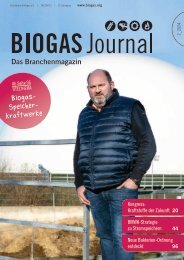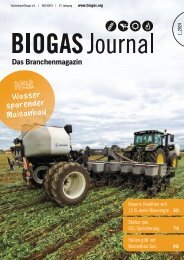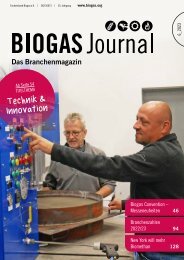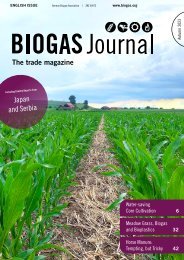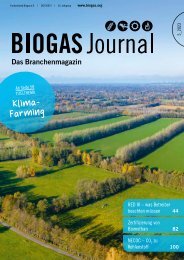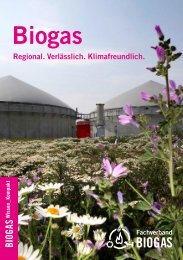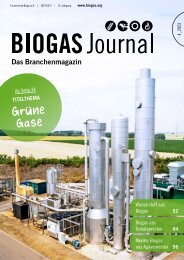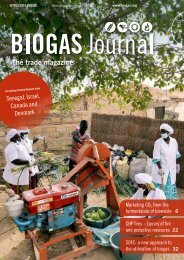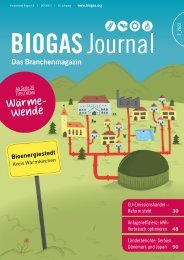Create successful ePaper yourself
Turn your PDF publications into a flip-book with our unique Google optimized e-Paper software.
Biogas Journal | <strong>Autumn</strong>_<strong>2017</strong> English Issue<br />
ffThe envirwonmental permitting agency<br />
of the federal state of Minas Gerais simplified<br />
the environmental permitting<br />
process for plants of up to 10 MW that<br />
convert biogas into electricity.<br />
Biogas plants (number<br />
and installed capacity in<br />
MW) 2014 and 2016 in<br />
Brazil<br />
Biogas plants in operation<br />
Number of plants<br />
Installed capacity in MW<br />
2014 2016 2014 2016<br />
ffIn March 2016, the Brazilian Electricity<br />
Regulatory Agency (ANEEL) amended<br />
resolution 482/2012, which made net<br />
metering for electricity generated from<br />
renewable energy sources possible and<br />
improved the framework conditions for<br />
decentralized biogas production and<br />
electrical power consumption. Now,<br />
plants with up to 5 MW el<br />
can be operated<br />
by cooperatives and offset with the<br />
electricity consumption in a relatively<br />
flexible manner or an electricity credit of<br />
up to 60 months can be saved.<br />
ffIn March 2016, the Brazilian Ministry<br />
of Cities included sewage gas production<br />
and use in the list of sewage treatment<br />
plant measures that can be financed.<br />
ffIn December 2016, the Regulatory<br />
Agency for Wastewater and Energy of the<br />
Federal State of São Paulo (ARSESP) introduced<br />
a draft of a regulation for feeding<br />
biomethane into the natural gas grid<br />
in São Paulo.<br />
As a result, the framework conditions are<br />
much better today and an increase in successful<br />
pilot projects can be expected,<br />
above all in the agricultural sector. In particular,<br />
the use of biomethane for transportation<br />
associated with agricultural<br />
Landfill gas 7 12 77 113<br />
Sewage gas 3 3 4 4<br />
Agriculture 10 11 2 2<br />
Agro-industry 2 3 0.9 1.8<br />
Total 22 29 84 120.8<br />
feedstocks seems promising and allows for<br />
scalable effects in Brazil, which can now be<br />
accessed through international technology<br />
cooperations with Europe, and which offer<br />
interesting possibilities for investments<br />
with further local market development.<br />
Companies such as AAT, Archea, Awite,<br />
ME-LE Biogas GmbH, Eco-GmbH, Suma,<br />
and other German and European biogas<br />
companies have already been active in<br />
Brazil for years and have found Brazilian<br />
partner companies or established their<br />
own branches. There are already large reference<br />
plants, most of which are operated<br />
together with local partners (see Figure 1<br />
and Figure 2).<br />
Alessandro Gardemann, Vice President of<br />
Abiogás, emphasizes: “The legal and regulatory<br />
foundations that we need for biogas<br />
Source: Brazilian Electricity Regulatory Agency (ANEEL)<br />
to become an industrial sector have been<br />
established. Now we have to build the<br />
plants. We need more investment, more<br />
research and development, more project<br />
developers, and more ideas for new business<br />
models”. This means, of course, that<br />
German technology providers are also urged<br />
to invest in Brazil.<br />
Authors<br />
Jens Giersdorf<br />
Wolfgang Roller<br />
Deutsche Gesellschaft für Internationale Zusammenarbeit<br />
(GIZ) GmbH<br />
SCN Quadra 01, Bloco C,<br />
Sala 1501, 70.711-902 Brasília-DF, Brazil<br />
e-mail: jens.giersdorf@giz.de<br />
e-mail: wolfgang.roller@giz.de<br />
41








